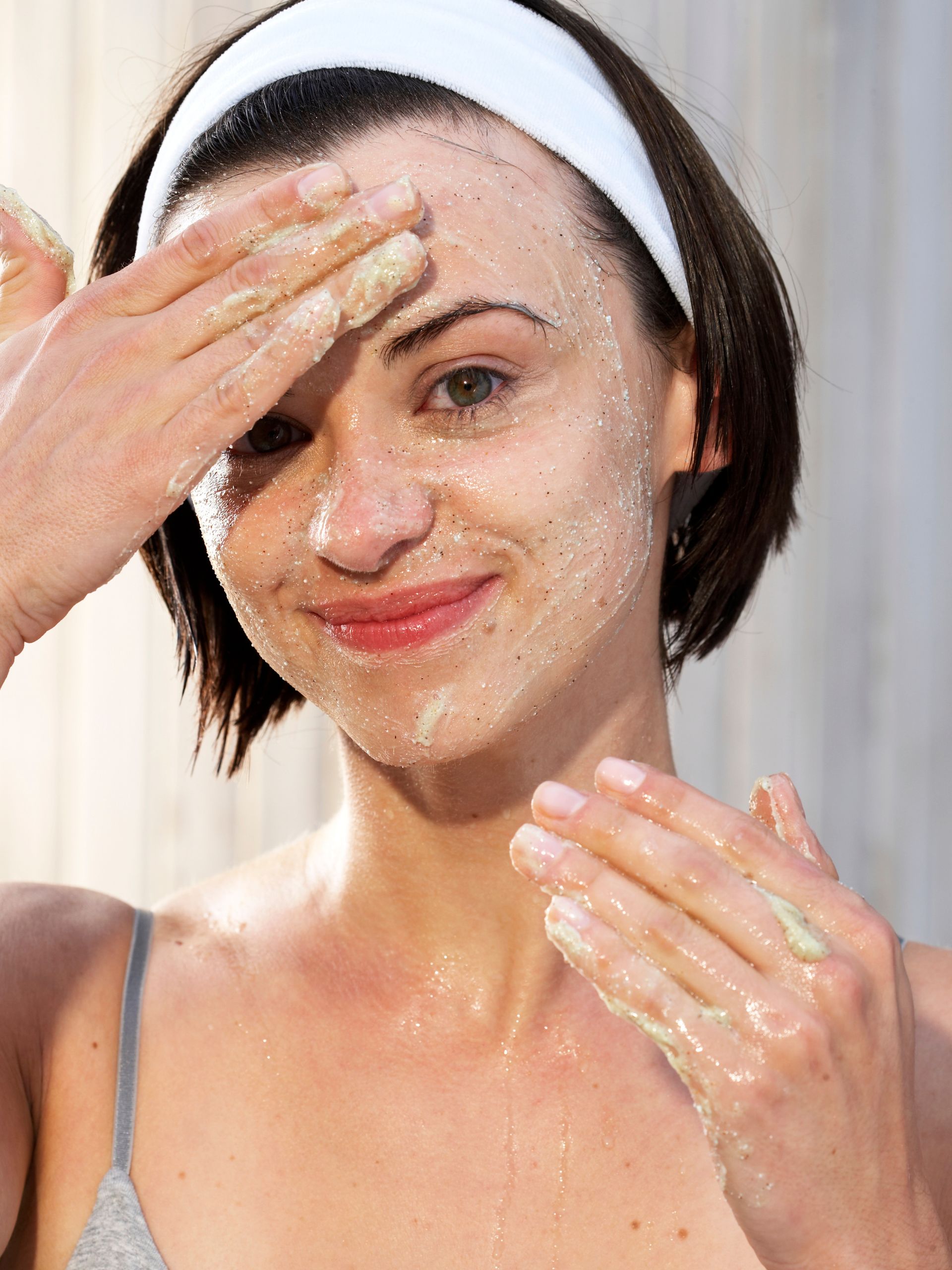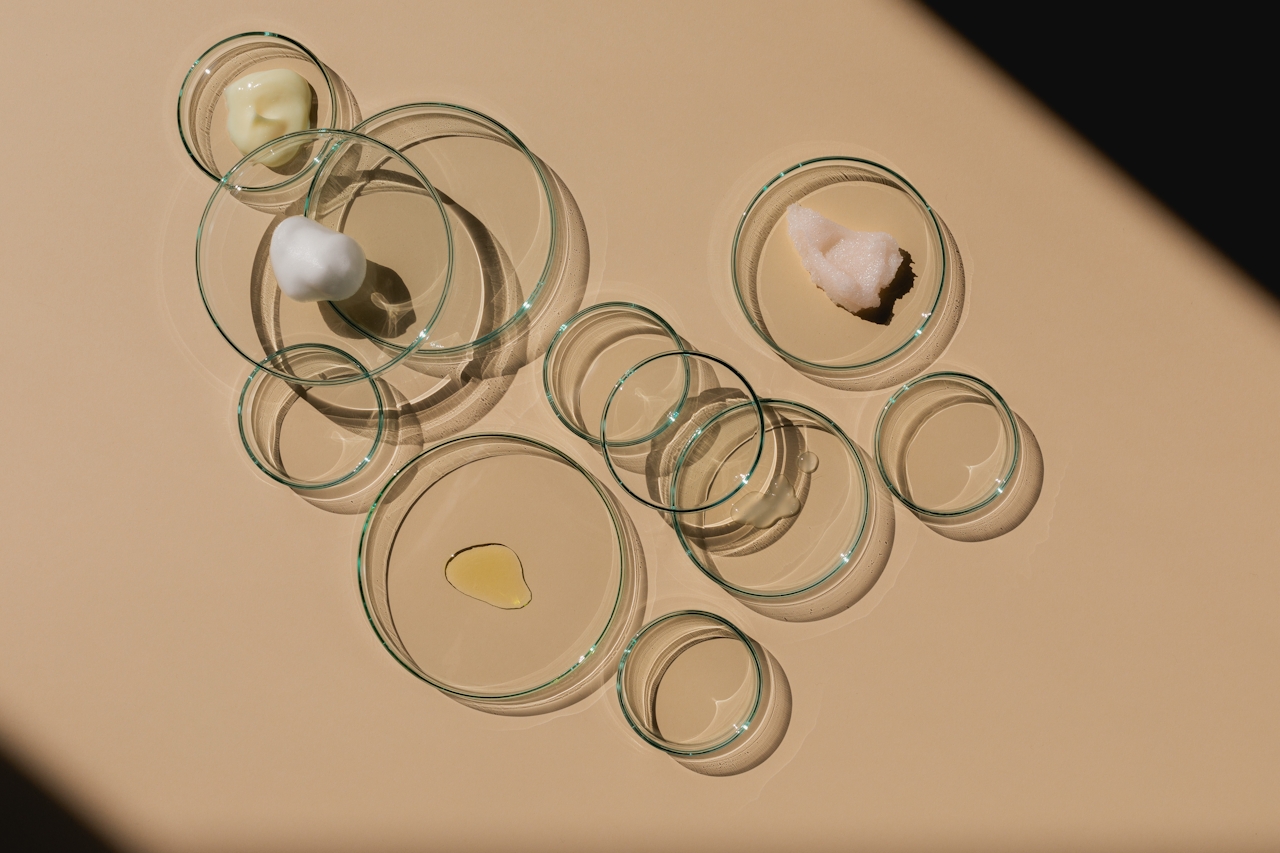
- Ageing Skin Characteristics
- What causes ageing skin?
- How to care for ageing skin
- 1. Use a moisturising cleanser in the morning, and double cleanse in the evening with an oil cleanser + gentle cleanser
- 2. Antioxidants + SPF are your best friends during the daytime
- 3. Use Vitamin A and retinol serums in the evening
- 4. Be generous with hydration
- 5. Exfoliate to remove dead skin
- 6. Never forget the SPF
- The Edit
Ageing Skin Characteristics
The reality is that we all age eventually, and collagen production (aka the fibres that are responsible for skin elasticity and hydration) begins to decrease the older we get. Ageing skin typically features the following characteristics:
- Fine lines and wrinkles like crow’s feet around the eyes
- Skin dullness, caused by reduced moisture levels
- Uneven skin tone
- Dry skin, sometimes with flakiness
- Age spots – also known as ‘age spots’ that are reddish and brown in colour
- Rough skin texture
- Visible pores
What causes ageing skin?
Honestly, time. It happens to all of us at some point or another. Other contributing factors include:
- Smoking and environmental aggressors like air pollution
- Over-exposure to UV rays (sun)
- Lack of sleep
- Excessive alcohol consumption
- Stress
- Weather changes
How to care for ageing skin
To care for ageing skin, the goal is prevention through protection. There are many anti-ageing products on the market, but the key is to find gentle products that have anti-ageing ingredients in them, as opposed to a ‘one size fits all’ anti-ageing product.
It’s important to note that ‘anti-ageing’ or ‘anti-aging’ are beauty buzzwords – you can’t actually stop ageing, but you can slow down the natural process.
1. Use a moisturising cleanser in the morning, and double cleanse in the evening with an oil cleanser + gentle cleanser
Keep the morning routine focussed on protection. A moisturising cleanser in the morning won’t strip away too much oil, so skin stays relatively soothed and hydrated from the night before.
Meanwhile, in the evening, cleanse dry skin with an oil cleanser. Oil cleansers contain natural oils and emollients that melt away makeup, impurities, excess oils and debris while moisturising skin. Then, use a gentle cleanser on a wet face to thoroughly cleanse the actual skin. Not thoroughly cleansing will only accelerate ageing.
Recommended products:
- Banila Co Clean It Zero Cleansing Balm Purifying
- The Ordinary Squalane Cleanser
- Kiehl’s Ultra Facial Cleanser
2. Antioxidants + SPF are your best friends during the daytime
Free radicals, like air pollution and UV radiation, are the worst for ageing skin because they can accelerate the ageing process. Antioxidants stop free radicals from penetrating the skin, and the more you have of it, the healthier your skin becomes.
There are many antioxidant-rich products out there. Look for ones with antioxidants like:
- Vitamin C – L-Ascorbic Acid, Sodium Ascorbyl Phosphate etc.
- Vitamin E – Ferulic Acid
- Green tea
- Coenzyme Q10
- Resveratrol
Last but not least, don’t forget to use sunscreen on top!
Recommended products:
- SkinCeuticals Silymarin CF Vitamin C Serum
- SkinCeuticals CE Ferulic Serum
- innisfree Green Tea Seed Serum
3. Use Vitamin A and retinol serums in the evening
Retinol (and Vitamin A in general) is the only thing that can visibly reduce wrinkles you already have. It’s honestly a jack of all trades, addressing wrinkles, fine lines, hyperpigmentation, age spots and much more. If you’re going to pick one active ingredient in your life to use, it should be this.
Vitamin A works in three ways:
- Speeds up cell turnover, which is your skin’s natural exfoliating process
- Accelerates collagen production, which keeps skin firm
- Destroys free radicals that gives you wrinkles
However, it’s not all fun and games with retinol. While it’s extremely beneficial for skin, it can also be irritating and cause your skin to flake. The key is to start small and slow, building up the dose and frequency over time.
Start with 1-2 times a week, for about 4 weeks. Then increase to 2-3 for the next 4 weeks, eventually increasing to everyday once your skin can withstand it.
It’s also important you don’t combine it with other actives that could counteract its effects or cause more irritation. Avoid using it with Glycolic Acid (AHA) or Salicylic Acid (BHA) and Vitamin C.
Recommended products:
- Medik8 Crystal Retinal 6
- Paula’s Choice Clinical Retinol Treatment Cream 1%
- Alpha-H Vitamin A Serum with 0.5% Retinol
4. Be generous with hydration
Ageing skin is susceptible to sagging and losing its firmness. That’s why moisturiser is essential. Aim to find one with hyaluronic acid. Hyaluronic Acid is able to attract 1000 times its weight in water, grabbing water in the air and binding it into the skin. Just make sure to apply this ingredient on damp skin.
Recommended products:
- Cetaphil Optimal Hydration Healthy Glow Daily Cream
- Aspect Super Moisturising Complex
- La Roche Posay Hyalu B5 Hyaluronic Acid Anti-Ageing Moisturiser
5. Exfoliate to remove dead skin
Dry ageing skin should be exfoliated at least once a week, as this helps remove dead skin and flaking.
Glycolic Acid (AHA) resurfaces the skin by dissolving the dead skin cells, removing rough patches and bringing that healthy glow back to skin. It can also hydrate your skin too.
Meanwhile, Salicylic Acid (BHA) is great if you still suffer from acne and breakouts. This acid penetrates skin and clears up oil, debris and dirt that is stuck in your pores. It’s also great for regulating oil production as well.
Recommended products:
- Paula’s Choice Advanced Smoothing Treatment 10% AHA
- Paula’s Choice SKIN PERFECTING BHA Liquid 2%
- Alpha-H Generation Glow Daily Resurfacing Essence
6. Never forget the SPF
We harp on about sunscreen quite a lot here, but for good reason. UV rays accelerate all the signs of ageing – wrinkles, dark spots, pigmentation, even breaking down your skin’s natural skin barrier. Don’t skimp on the sunscreen, and always re-apply if you’re outside.
Recommended products:
- Ultraceuticals Ultra UV Protective Daily Moisturiser SPF 50 Hydrating
- Naked Sundays SPF50+ Hydrating Glow Mist
- SkinCeuticals Ultra Facial Defense SPF50+
The Edit
- Banila Co Clean It Zero Cleansing Balm Purifying
- The Ordinary Squalane Cleanser
- Kiehl’s Ultra Facial Cleanser
- SkinCeuticals Silymarin CF Vitamin C Serum
- SkinCeuticals CE Ferulic Serum
- innisfree Green Tea Seed Serum
- Medik8 Crystal Retinal 6
- Paula’s Choice Clinical Retinol Treatment Cream 1%
- Alpha-H Vitamin A Serum with 0.5% Retinol
- Cetaphil Optimal Hydration Healthy Glow Daily Cream
- Aspect Super Moisturising Complex
- La Roche Posay Hyalu B5 Hyaluronic Acid Anti-Ageing Moisturiser
- Paula’s Choice Advanced Smoothing Treatment 10% AHA
- Paula’s Choice SKIN PERFECTING BHA Liquid 2%
- Alpha-H Generation Glow Daily Resurfacing Essence
- Ultraceuticals Ultra UV Protective Daily Moisturiser SPF 50 Hydrating
- Naked Sundays SPF50+ Hydrating Glow Mist
- SkinCeuticals Ultra Facial Defense SPF50+



